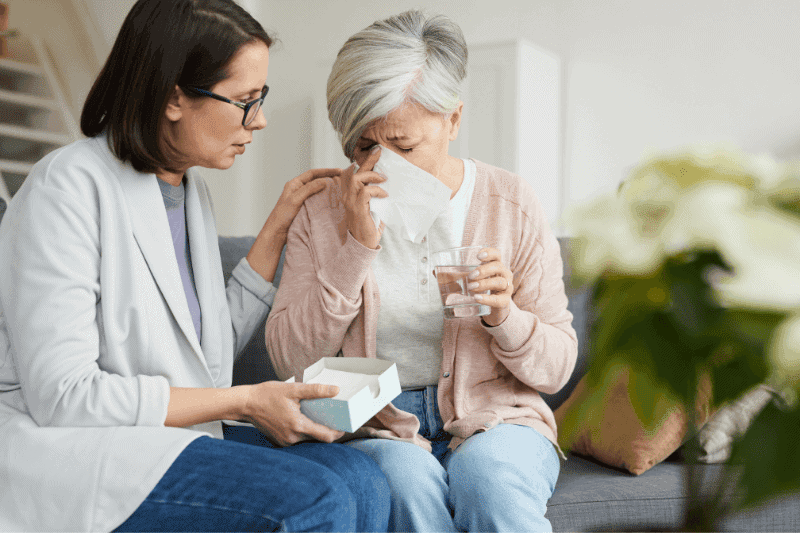
Time to bolster community-based AHPs’ mental health skills?
Very few people have remained unscathed or untouched by the COVID-19 pandemic. The mental health impacts that have arisen from COVID-19, including uncertainty, isolation, the loss of or distance from loved ones, the direct effects of falling ill, or inability to access appropriate services for other needs cannot be underestimated.
For some people, contact with their health care provider can be the only regular human contact they have. It’s not surprising then, that throughout the pandemic, users of community-based AHPs have increasingly raised mental health issues with their AHP or shown symptoms of one or more common mental illnesses (anxiety, depression, and distress).
Mental health support and management is a core component of many AHP’s roles (think psychologists, mental health occupational therapists and social workers). For many other AHPs, however, screening and managing mental illness is not part of their core clinical skills, and generally speaking, they lack confidence and competence in this area. Increasingly, community based AHPS are finding themselves involved in conversations with their clients about mental illness and trying to navigate complex and inadequate mental health care systems on their behalf.
This article draws on recent research which examined the experiences of AHPs without a mental health background working with clients with unexpected mental illnesses. We consider the system and training support needs of AHPs working with people in the community setting living with physical and mental health illnesses. Finally, we look at some actions that AHPs can take to support their clients’ mental health needs.
What are AHPs’ experiences working with clients with unexpected mental illness?

We undertook a focus group study of 21 community-based general occupational therapists (OTs) in rural, regional, and metropolitan Australia. General OTs that work in the community (i.e., non-mental health setting) have foundational knowledge and skills in mental health but may not have specific experience or expertise in this area. We found that OTs are increasingly encountering clients with unexpected mental illnesses.
OTs often work in their clients homes and consider this one of the reasons they open up to their OT about their mental illness or symptoms – even before the COVID-19 pandemic. These same clients may be unwilling to seek mental health care, due to stigma around mental illness, inconvenience or denial of their mental health issues.
OTs in our study highlighted the time it takes to engage in discussions about mental health with their clients, time that may not be allocated for visits.
Although OTs find that they frequently discuss mental illness and symptoms with their clients, they rarely use a formal screening or assessment tool to identify the severity of symptoms and the appropriate action to be taken, which is considered an effective secondary prevention strategy. OTs do recognise the potential value of routine mental illness screening for their clients. However, they would only routinely screen for mental illness after targeted training and if system-level changes were made, so they could make referrals or take other actions as appropriate.
What are AHPs’ mental health skill development needs?

While OTs may commonly work with people experiencing mental illness it that doesn’t mean they (or AHPs more broadly) feel they have the skills to take the right action and provide the level of support needed. They draw on their general clinical skills and refer to other healthcare professionals (e.g., social workers, counselors, GPs), however, OTs don’t always feel that their response “in the moment” is optimal.
OTs recognised that they need to bolster their confidence in screening for and discussing mental illness, without the fear of “opening up a can of worms” or leaving clients in the lurch.
Matt Boden and co-authors highlighted the potential for AHPs’ mental health skills to be enhanced so that they can provide brief supportive interventions for people experiencing mental illness in a range of settings to support vulnerable people.
What else is needed for AHPs to use their mental health skills and provide comprehensive client-centred care?

The main concern expressed by OTs in our study was the lack of community-based services to support those with non-acute mental illness. When people present with severe mental health symptoms, the referral pathway seems clearer (e.g., contact the emergency mental health support team or other first responder services). Supporting clients with mental health symptoms that are less severe and yet still impact their function and wellbeing, is notoriously difficult.
Clear and reliable referral pathways are needed so that AHPs and non-mental health-specific clinicians can identify their clients’ needs and develop a plan to ensure they can access the most appropriate services in a timely manner. This is difficult in the face of an enduring shortage of community-based mental health services. This is not a new problem – health workforce shortages are evident across the board and the COVID-19 pandemic has simply shone a new and brighter light on the lack of mental health services.
Training and funding more mental health workers and services are important strategies to meet the demand for these services, however other diverse and sustainable strategies are needed. Enhancing workforce flexibility and maximizing workforce utility is yet another key strategy: for example, ensuring AHPs’ mental health skills are optimised so they can identify and provide brief and targeted support for clients with symptoms of mental illness.
AHPs are already under huge demand and are stretched in terms of their time, so I am not suggesting that all AHPs need to add mental health assessment and management to their core business. Nor am I suggesting that non-mental health-specific clinicians replace psychology, counseling, social work, psychiatry, and specialized mental health services. However, given that AHPs are frequently engaging in conversations with their clients about their mental health, it is important to recognise the role that these clinicians play in supporting and promoting mental health. It also makes sense to bolster their knowledge and confidence in screening for and providing brief interventions for common mental illnesses.
What can AHPs do to support their clients’ mental health needs?

Some actions that AHPs can take to upskill, prepare, and support their clients’ mental health include:
- Complete a Mental Health First Aid (MHFA) training course. MHFA courses are offered all around the world and aim to equip members of the community with skills needed to respond to someone experiencing a mental health crisis
- Social prescribing, which an important strategy to address mental illness, psychosocial and socioeconomic issues. AHPs are already doing social prescribing, often referring their clients to community groups, arts and exercise programs
- Have the details of local referral agencies for people experiencing mental health crises. For example, Beyond Blue, Lifeline (Aus), Crisis hotlines and resources, Lifeline (USA), Mental Health Helpline
Summary
Community-based AHPs are increasingly engaging with clients with unexpected mental illnesses, a trend likely to continue along with the COVID-19 pandemic. AHPs draw on existing general clinical skills to manage conversations but often leave their clients with a feeling that they could have done more.
Mental health services are limited – and stretched! Referral pathways are unclear, meaning that many people are not getting the right level of care to meet their needs.
With targeted training, community-based AHPs are well-placed to routinely screen and identify their clients’ mental health needs, provide immediate brief, evidence-based support and make appropriate referrals for comprehensive client-centred care.
AHPs can improve their mental health skills by completing an MHFA course (much like many AHPs need to maintain cardiopulmonary resuscitation skills!). They can provide more comprehensive care by adding social prescribing to their toolkit. Finally, AHPs can be prepared to support their clients by ensuring they have relevant referral agency contact details at hand in case of a mental health crisis.
We’d love to hear your thoughts about AHPs’ roles in promoting optimal mental health and their training and support needs. Please let us know your experiences by commenting below.





